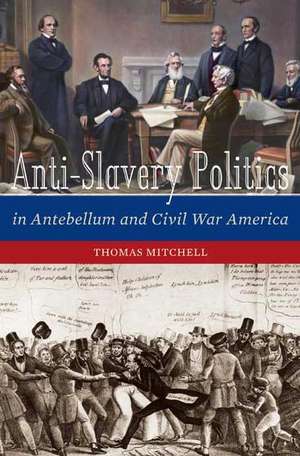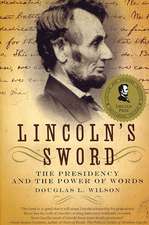Antislavery Politics in Antebellum and Civil War America
Autor Thomas G. Mitchellen Limba Engleză Hardback – 29 mar 2007 – vârsta până la 17 ani
Preț: 357.89 lei
Preț vechi: 416.35 lei
-14% Nou
Puncte Express: 537
Preț estimativ în valută:
68.54€ • 70.62$ • 57.42£
68.54€ • 70.62$ • 57.42£
Carte tipărită la comandă
Livrare economică 22 februarie-08 martie
Preluare comenzi: 021 569.72.76
Specificații
ISBN-13: 9780275991685
ISBN-10: 0275991687
Pagini: 296
Dimensiuni: 156 x 235 x 28 mm
Greutate: 0.61 kg
Editura: Bloomsbury Publishing
Colecția Praeger
Locul publicării:New York, United States
ISBN-10: 0275991687
Pagini: 296
Dimensiuni: 156 x 235 x 28 mm
Greutate: 0.61 kg
Editura: Bloomsbury Publishing
Colecția Praeger
Locul publicării:New York, United States
Notă biografică
Thomas G. Mitchell is the author of Indian Fighters Turned American Politicians: From Military Service to Public Office (Greenwood, 2003), Liberal Parties in Settler Conflicts (Greenwood, 2002), Native vs. Settler: Ethnic Conflict in Israel/Palestine, Northern Ireland, and South Africa (Greenwood, 2000).
Recenzii
This history of the abolitionist movement in the United States focuses on the successes and failures of the movement within the electoral arena and, upon the electoral success of the Republican Party and the outbreak of the Civil War, within the political arena of government. It thus looks at the failures of the Liberty Party and the Free Soil Party/Free Democrats to achieve successes as third parties due to the nature of the American political system, party strategies, and political exigencies and the contrasting success of the more internally coherent Republicans to become a replacement second party for the Whigs, partly due to an atmosphere where Northerners felt more threatened by the Slave Power than in prior times and partly because they had a broader range of issues with which to attract supporters.













